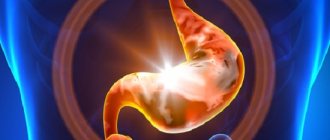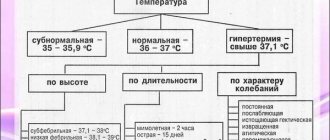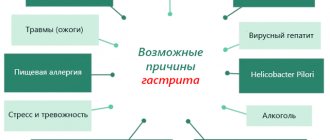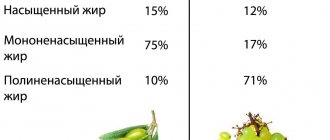Therapeutic fasting , also called fasting-dietary therapy, is a complete refusal of food for a period of 2 to 30 days, followed by the gradual introduction of dietary products into the diet.
During the “hungry” period, the body receives substances from its own reserves - mainly due to the breakdown of fats. This treatment is used for many diseases of internal organs, including gastritis.
In what cases is it advisable to use it and is every gastritis amenable to such therapy? Let's deal with all the doubtful points in order.
Types of fasting
Fasting can be more or less strict and is carried out according to one of the following schemes:
- Complete hunger is a ban on eating any food; you are only allowed to drink water without additives.
- Absolute, “dry” fasting is the exclusion of not only food, but also water from the diet. Its duration should not exceed 3 days.
- Combined – consists of alternating regular and absolute fasting.
- Fractional – periodically conducting several fasting and dietary courses in a row.
- Staged fasting is similar to fractional fasting, but in this case the periods of abstinence from food are shortened.
In medical practice, various options for complete fasting are most often used, including fractional and stepwise fasting. “Dry fasting” is necessary only for patients with severe edema, bronchial asthma, allergic phenomena, and skin diseases.
Indications and contraindications
Fasting and dietary therapy is indicated not only for the treatment of gastritis. It applies in the following cases:
- high blood pressure;
- cardiac ischemia;
- bronchial asthma, chronic bronchitis;
- functional disorders of the gastrointestinal tract;
- inflammation of the pancreas, intestines;
- obesity;
- uncomplicated liver diseases;
- infertility;
- skin diseases;
- allergies;
- mental illness;
- pathology of the musculoskeletal system.
In this case, it is necessary to take into account the severity of the disease, the presence of concomitant pathologies and the ongoing drug treatment.
Peculiarities. In particular, if the patient receives systemic therapy with hormonal drugs - glucocorticoids - for asthma or joint diseases, then complete fasting is contraindicated for him. This is due to the negative effect of these hormones on the gastric mucosa.
Fasting is absolutely contraindicated for:
- weight deficiency;
- endocrine diseases of the adrenal glands, thyroid gland, pituitary gland;
- rheumatism;
- malignant neoplasms;
- active tuberculosis;
- nonspecific ulcerative colitis, Crohn's disease;
- active hepatitis;
- severe renal or heart failure;
- purulent processes in the abdominal cavity;
- increased blood clotting;
- arrhythmias;
- previous heart attack or stroke;
- pregnancy and lactation;
- aged less than 10 and more than 75 years;
- epilepsy.
In addition, starvation treatment is not carried out if the diagnosis is in doubt. In each case, the decision on the possibility of fasting is made individually, taking into account the entire range of indications and contraindications.
Therapeutic fasting for various forms of gastritis
In case of acute inflammation of the stomach and in the active stage of the chronic process, complete fasting is necessary.
It is usually prescribed for 1-3 days, depending on the severity of symptoms and the speed of their regression. During this period, you are only allowed to drink still water and drug treatment is carried out at the same time. After the condition has stabilized, vegetable purees, mucous soups, and jelly are introduced into the diet. The diet is expanding gradually.
In case of chronic hyperacid and erosive gastritis, long-term fasting is contraindicated. This is due to the corrosive effect of hydrochloric acid on the mucous membrane. If, with gastritis with high acidity, food does not enter the stomach, then it begins to digest its own walls.
Normally, against the background of hunger, gastric secretion decreases. However, in the presence of gastritis, basal secretion is also increased, occurring without an irritant. This means that acidity levels will still not return to normal without appropriate drug treatment.
Therapeutic fasting is practiced for chronic atrophic, hypo- and anacid gastritis. In this case, it normalizes the motility of the digestive tract, allows you to slightly increase the pH level and relieve inflammation from the gastric mucosa due to its functional rest. Usually complete fasting is prescribed, the duration of which is very variable and depends on the general condition of the patient.
Important! Absolute fasting for gastritis is not practiced, since the inflammatory process may intensify against the background of insufficient fluid intake.
If a Helicobacter pylori infection is detected in a patient, eradication therapy is first carried out.
Benefits of the procedure
If the functionality of the stomach is impaired, the mucous membrane does not always fully digest food. Short fasting allows you to relieve stress from the diseased organ. The absence of food in the stomach helps restore internal surfaces and heal wounds. During the period of fasting, the stomach does not expend energy on the production of digestive juices, so it is activated to renew mucous surfaces. Lack of nutrition kills bacteria without the use of drugs.
Fasting is not an effective method of treating severe gastric diseases. In the presence of an erosive form of pathology, gastric juice, which improves the digestion of food, will act directly on the diseased area, which will contribute to the development of serious complications and ulcers.
Attention! High acidity of gastric enzymes is an indicator of the prohibition of fasting, since constantly produced gastric juice is a rather aggressive irritant.
In case of low acidity, short-term fasting can be used in the treatment of gastritis, during which the body has time to successfully cleanse itself. Temporarily refusing food is useful during the acute phase of the disease, provoked by pathogens. Due to the lack of nutrition, the infection will not spread. During fasting, natural restoration of tissues damaged by toxins occurs.
How to prepare for fasting-dietary therapy
When planning a course of therapeutic fasting, you first need to make an appointment with a doctor to carry out the necessary diagnostics. Without tests and other diagnostic procedures, you cannot start fasting with gastritis. An indicative list of necessary examinations is as follows:
- general blood analysis;
- biochemical blood test (liver tests, total protein, glucose, cholesterol and other parameters as indicated);
- general urine analysis;
- feces on worm eggs;
- ECG;
- FGDS with pH-metry;
- Ultrasound of the abdominal organs;
- fluorography.
Depending on the results obtained, the doctor determines whether fasting-dietary therapy is indicated for the patient and whether there are any restrictions on its use.
Then they choose a method of fasting and plan its duration. An important point is to resolve the issue of the conditions for carrying out fasting-dietary therapy. If we are talking about short-term fasting for 1-5 days, then it can be carried out at home. If you refuse food for a long time (from a week to a month), it is recommended to go to the hospital. This will allow you to monitor both positive and negative changes in the body, and notice the risk of complications in time.
Note. When fasting at home, you still need to be examined by a specialist, especially if this is a new technique for you. You need to visit a doctor directly during the period of refusal to eat and at the stage of recovery from hunger.
Side effects
Fasting in some cases can cause symptoms that can pass quickly, but if they are pronounced, you should immediately take the necessary measures and consult your doctor.
- unbearable feeling of hunger, observed for more than 2 - 3 days;
- nausea, dizziness;
- headache;
- pain in the stomach;
- weakness, fatigue;
- unpleasant sensations and odor in the mouth.
Experienced fasting adherents claim that with the right approach to this practice, the duration of the cleansing period can be increased to two weeks. It is possible to completely recover from an acquired disease with the help of fasting or diet only in the early stages. You should also remember that by starting to eat unhealthy food again, you provoke the risk of a return of already cured gastritis.
If you decide to engage in therapeutic fasting for the purpose of recovery or fast according to Orthodox canons, you must definitely consult with your treating gastroenterologist. Only a specialist, when conducting diagnostics, will be able to recommend or prohibit the practice of fasting in each specific case.
Fasting period: problems and features
In most cases, with chronic gastritis, complete fasting is recommended, but drinking liquid is not forbidden. The daily water requirement is from 1 to 1.5 liters. You can drink not only still mineral water, but also rosehip decoction or weak green tea without additives. Every day, fasting patients are given cleansing enemas to avoid intoxication.
There are 3 successive stages in the fasting process:
- Food excitation is the appearance of a strong feeling of hunger. Characteristic for the first three days of treatment. In this case, a “sucking” sensation in the pit of the stomach, headaches, weakness, and insomnia occur. If the symptoms are moderate, then there is no reason to sound the alarm - this is a natural course of fasting.
- Increasing ketoacidosis is the accumulation of ketone bodies in the blood. These are products of fat metabolism, the amount of which increases under conditions of insufficient supply of nutrient substrates from outside. During this period, patients smell of acetone from their breath, and a white coating forms on the tongue. The feeling of hunger is dulled, and blood pressure levels decrease.
- Compensation for ketoacidosis . After the maximum increase in the concentration of ketone bodies, which is called the “ketoacidotic crisis,” their level begins to decline. The general condition of the body improves, the symptoms of the underlying disease decrease, the tongue is cleansed, and the smell of acetone disappears.
If the fasting-dietary therapy technique is not followed, complications may arise:
- vomiting, nausea;
- heart rhythm disturbances;
- fainting due to decreased blood pressure;
- a sharp increase in blood pressure during the withdrawal of antihypertensive drugs;
- renal or biliary colic in the presence of stones;
- formation of stomach ulcers;
- convulsions;
- uterine bleeding in patients with fibroids or endometriosis.
If “suspicious” symptoms appear, you should immediately report them to your doctor. In these cases, fasting is usually canceled.
A way out of hunger
The process of returning to regular eating should be gradual. The longer the “hungry” period was, the longer the process of adaptation of the body to food will be. It also has 3 stages:
- Asthenic , accompanied by weakness, discomfort in the upper abdomen, and rapid heartbeat. It lasts 2-3 days, when patients begin to be given fruit juices and rice water, 100-200 ml 5 times a day. This is the most dangerous period, since with a rapid resumption of nutrition (especially with the early introduction of protein foods), refeeding syndrome may develop. This condition was first described in liberated concentration camp prisoners. It manifests itself as disruptions in the functioning of the cardiovascular system: life-threatening arrhythmias, a drop in blood pressure, even to coma.
- Intensive recovery lasts approximately half of the period of complete fasting. The patient feels better and has an appetite. Liquid porridges in water without salt are introduced into the diet - millet, rice, buckwheat. After a week, you can add milk and butter to porridge, and introduce bread and fermented milk products into your diet.
- The normalization stage is characterized by the complete restoration of normal nutrition. Boiled meat, vegetables, pasta, and puree soups are gradually added to the diet. The patient’s well-being returns to normal, digestion resumes in full.
They begin to consume salt no earlier than 3 weeks after the end of fasting. Otherwise, there is a risk of persistent swelling.
In this video, doctors answer the most common questions about fasting and dietary therapy.
Fasting is a treatment method with proven effectiveness, which is successfully used for many pathologies. For patients with chronic gastritis, this method even helps to give up medications for a while. Of course, provided that further nutrition after fasting-dietary therapy is balanced and gentle.
Never try to fast on your own. A preliminary visit to the doctor and a comprehensive examination will help to avoid serious complications and make fasting as effective as possible.
Recommendations
If the patient has not previously been prescribed therapeutic fasting, it should be introduced slowly, starting from one day a week. It is necessary to carefully monitor the condition, constantly assessing it. If the preparation is carried out correctly, your health will be satisfactory, and hunger pangs will not become unbearably painful.
When a patient is not suitable for cleansing using such therapy, he will be plagued by irritability, emotional and physical dissatisfaction, and severe pain in the stomach area. This indicates the need to stop fasting and conduct additional examinations. Perhaps there are hidden pathologies that appear when food consumption is excluded. If you feel well, the duration of the fasting period can reach 7-10 days.











